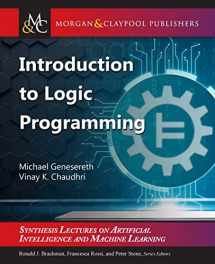
Introduction to Logic Programming (Synthesis Lectures on Artificial Intelligence and Machine Learning)
Book details
Summary
Description
Product Description
This is an introduction to Logic Programming theory, current technology, and popular applications. It is an innovative, model-theoretic approach to logic programming.Logic Programming is a style of programming in which programs take the form of sets of sentences in the language of Symbolic Logic. Over the years, there has been growing interest in Logic Programming due to applications in deductive databases, automated worksheets, Enterprise Management (business rules), Computational Law, and General Game Playing.
It begins with the fundamental notion of datasets, i.e., sets of ground atoms. Given this fundamental notion, it then introduces views, i.e., virtual relations; and defines classical logic programs as sets of view definitions, written using traditional Prolog-like notation but with semantics given in terms of datasets rather than implementation. It then introduces actions, i.e., additions and deletions of ground atoms; and defines dynamic logic programs as sets of action definitions.
In addition to the printed book, there is an online version of the text with an interpreter and a compiler for the language used in the text and an integrated development environment for use in developing and deploying practical logic programs.
About the Author
Michael Genesereth is a professor in the Computer Science Department at Stanford University and a professor by courtesy in the Stanford Law School. He received his Sc.B. in Physics from M.I.T. and his Ph.D. in Applied Mathematics from Harvard University. Genesereth is most known for his work on Computational Logic and applications of that work in Enterprise Management, Computational Law, and General Game Playing. He is one of the founders of Teknowledge, CommerceNet, Mergent Systems, and Symbium. Genesereth is the current director of the Logic Group at Stanford and co-founder and research director of CodeX (the Stanford Center for Legal Informatics).
Vinay K. Chaudhri is formerly a program director in the Artificial Intelligence Center at SRI International, and currently affiliated with the Stanford Computer Science Department. He received his Ph.D. in Computer Science from University of Toronto, Canada. Dr. Chaudhri is a recognized expert on artificial intelligence, including knowledge representation and reasoning, question answering, ontologies, and knowledge acquisition. At Stanford his activities include promoting logic education for secondary schools, investigating techniques for rapidly acquiring formal knowledge and productizing intelligent textbooks. He consults with the financial industry on computable contracts and knowledge graphs. He has also taught courses on knowledge representation and reasoning and logic programming.
Jacobs Technion-Cornell Institute at Cornell Tech
AI Ethics Global Leader, IBM Research AI
University of Texas at Austin


We would LOVE it if you could help us and other readers by reviewing the book
Book review



